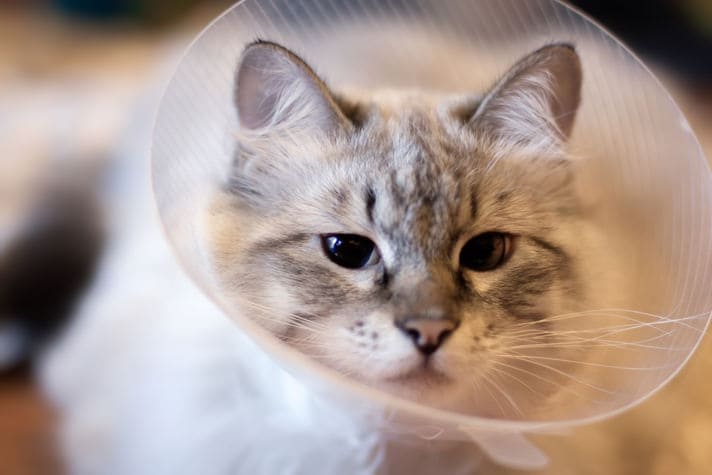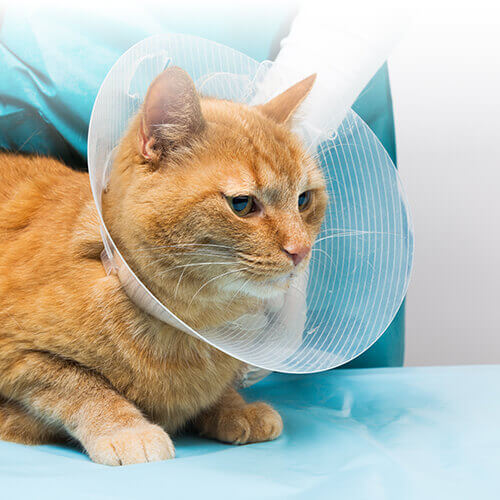There comes a time in every cat owner’s life when they must make the decision whether or not to neuter their pet. While there are neuter cat pros and cons to both sides of the argument, most veterinarians would agree that spaying or neutering a cat is ultimately best for their health.
There are a number of benefits to neutering a cat. Not only does it make them easier to manage, but it can also help keep them healthy.
If you’re considering having your cat neutered, here are some things you should know. Here we’ll explore some of the reasons why you may want to consider having your feline friend sterilized.
Table of Contents
Should you neuter an indoor cat?

While there are many benefits to spaying or neutering your cat, it is not always necessary. If your cat is strictly indoor, there is no need to worry about them getting pregnant or impregnating another cat. However, there are still some advantages to spaying or neutering an indoor cat.
For example, it can help to reduce roaming behavior and spraying. It can also make your cat less aggressive, making them easier to get along with other pets in the house.
Ultimately, the decision of whether or not to neuter an indoor cat is a personal one. However, if you are considering it, there are certainly some benefits worth taking into account.
When deciding whether or not to neuter an indoor cat, there are a few factors to consider. One is the cat’s age. It is generally recommended that cats be neutered before they reach sexual maturity, which is typically around six months of age. This can help to prevent unwanted litters and reduce the risk of certain behavioral problems. Another factor to consider is whether or not the cat will ever go outside.
Cats who are strictly indoor pets have a much lower risk of contracting diseases and getting into fights with other animals. As a result, they may not need to be neutered in order to stay healthy. Finally, it is important to think about what you hope to achieve by having your cat neutered.
Why should you NOT neuter your cat?
The reasons for neutering are varied, but often include population control, reduction of aggression, and prevention of unwanted pregnancy. Neutering a cat can have a number of benefits, including reducing territorial behavior and allowing the animal to live a longer, healthier life.
However, there are also a number of reasons why you might not want to neuter your cat. First, the surgery can be risky, and cats may experience complications such as infections, bleedings, and damage to the urinary tract. Second, neutering can lead to weight gain and other health problems. Finally, neutered cats may become less active and more prone to behavioral problems.
Additionally, neutering can be a costly procedure, and it requires the owner to take on the responsibility of ensuring that their cat does not mate. If you are considering whether or not to neuter your cat, it is important to weigh all of the pros and cons before making a decision.

Neuter Cat Pros and Cons
Pro: Controls Cat Population

As any cat lover knows, cats can reproduce at an alarming rate. A single unspayed female can give birth to dozens of kittens over the course of her lifetime, and those kittens can quickly start producing their own litters. As a result, it’s not uncommon for a small group of cats to balloon into a full-blown colony in a matter of months.
While there’s something charming about a busy street corner full of mewling felines, the reality is that such uncontrolled reproduction can lead to serious problems. Overpopulation can lead to dwindling food supplies and increased competition for mates, while also increasing the risk of disease.
Every year, thousands of kittens are born to stray and feral cats who are unable to find homes. As a result, many of these kittens wind up in shelters, where they may be euthanized if they are not adopted. By spaying or neutering your cat, you can help to reduce the number of unwanted kittens and give them a better chance at finding loving homes. By neutering your cat, you can help to limit the number of homeless cats.
Pro: Make Cats Live Longer

Spaying or neutering your cat can also help to improve their health. Studies have shown that, on average, neutered cats live longer than those that are left intact. There are a number of reasons for this. One is that neutered cats are less likely to roam, and as a result, are less likely to be hit by cars or get into fights with other animals.
Cats that have been spayed or neutered are less likely to develop cancer and other health problems. Neutered cats are less likely to contract certain diseases, such as feline leukemia virus and feline immunodeficiency virus. Female cats who are spayed have a lower risk of developing uterine cancer, and male cats who are neutered have a lower risk of developing testicular cancer. For all of these reasons, neutering can help your cat to live a longer and healthier life.
Pro: Reduces Cat Anxiety in the Middle of the Night

Neutering can help to reduce aggression and roaming behaviors, and it has also been shown to have a calming effect on cats. This can be especially beneficial for those who live in urban areas and are bothered by their cats meowing and scratching at doors and windows in the middle of the night.
A cat’s “crying” in the middle of the night is more than just a nuisance to its owner – it can be a sign of anxiety. Unneutered male cats will often “cry” as they roam the neighborhood looking for a mate. Females in heat will also “cry” as they advertise their availability to males. Once a cat is spayed or neutered, the behavior usually stops.
While spaying or neutering will not eliminate all behavioral problems, it can help to reduce anxiousness and make your cat happier and more content.
Con: Cat Personality may Change after Neutering

When you neuter a cat, their personality may change. This is because they no longer have testosterone, which can make them more aggressive. Neutering can also help to reduce territorial behavior and fighting.
In addition, cats who have been neutered are less likely to spray urine to mark their territory. However, neutering may also cause your cat to become less active and more prone to weight gain. Overall, the decision to neuter your cat is a personal one that depends on your pet’s individual personality and needs. If you are considering neutering your cat, be sure to talk to your veterinarian about the potential risks and benefits.
Con: Cats Tend to be Indifferent to their Owners After Neutering

After neutering, many cats become less interested in their owner’s affection. They may be more likely to ignore their owner’s calls, and they may no longer seek out their owner’s lap for cuddles. While this change in behavior can be disappointing for cat owners, it is important to remember that neutering does not automatically make a cat lazy or uninterested in its owner.
In fact, many cats continue to be active and affectionate after neutering. The decision to neuter should be made based on the individual cat’s needs and temperament, not on the assumption that it will lead to a decrease in affection.
Con: Cats are Prone to Loss of Appetite After Neutering

A cat’s appetite after neutering can be very different from their appetite before. Some cats become more ravenous, while others may lose interest in food altogether. However, the vast majority of cats will experience a loss of appetite to some degree. This is usually due to the anesthesia used during the surgery, which can take a while to wear off.
In addition, the stress of the surgery itself can lead to a decrease in appetite. For these reasons, it’s important to keep an eye on your cat’s eating habits after they’ve been neutered and make sure they’re getting enough to eat. If you’re concerned about your cat’s appetite, talk to your vet for advice on how to encourage them to eat.
Conclusion
Overall, neutering cats has a number of pros and cons. The most obvious pro is that it limits the number of offspring a cat can have, which in turn helps to control the population of stray and feral cats. It also has health benefits, such as reducing the risk of some diseases- and may make cats live longer.
Additionally, neutering can help reduce cat anxiety at night. However, there are some potential drawbacks, such as changes in personality or indifference towards their owners. Cats may also lose their appetite after neutering surgery.
All things considered, neutering is ultimately a personal decision for pet owners to make based on what they feel is best for their indoor cat.






